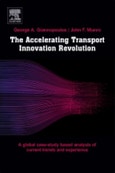The Accelerating Transport Innovation Revolution: A Global, Case Study-based Assessment of Current Experience, Cross-sectorial Effects and Socioeconomic Transformations, offers a comprehensive view of current state-of-the-art and practices around the world to create innovation on a revolutionary scale and connect research to commercial exploitation of its results. It offers a fascinating new model of the innovation process based on theories of biological ecosystems, general systems theory and basins of attraction (represented through space-time graphs well known in mathematics). Furthermore, it considers - through a number of dedicated chapters - key issues and elements of innovation ecosystems, such as: Causal Factors and system constraints affecting the development and sustainability of innovation ecosystems (Chapter 4); Review of innovation organization and governance in key countries and regions (Chapter 5); the role of technological "Spillovers" (Chapter 6); Collection and use of data for innovation monitoring and benchmarking (Chapter 7); Intellectual Property protection between competing ecosystems (Chapter 8); Economics of innovation (Chapter 9); Public and private sector involvement in Transport innovation creation (Chapter 10); the role of the individual entrepreneur - innovator in energizing change (Chapter 11). Finally, in Chapter 12, there is a thorough summary of key findings.
This book uses a paradigmatic approach to augment the innovation ecosystem model of innovation that integrates beliefs and learning into the innovation ecosystems model. It therefore includes ten case studies from the U.S., Europe and Asia, detailing how innovation is created across continents and different ecosystems and what are the critical lessons to be learned. It does this, effectively, at five different levels of analysis i.e. the individual innovator / entrepreneur level, the organization level (government agency or company), the regional ecosystem level, the nation-state level and the global - systemic or international level. Each level of analysis, reveals unique features of the innovation landscape and the ten case studies allow the reader to assess when and where specific "enablers" are facilitating innovation especially on a revolutionary scale.
The need for the book came from the realization that despite the billions of dollars spent on various research programs over the past 20 years (especially in the public sector), there have been few clear and tangible efforts directed at exploring how innovation production increasingly occurs and the critical factors necessary to sustain large-scale, revolutionary change as the future unfolds. Thus, a primary theme of the book is that understanding how research results translate into market innovation and implementation, especially understanding the nature of revolutionary innovation, is as important as the creation of innovations themselves.
While the focus of the book is on Transportation, the concepts and recommendations presented apply to other fields too.
Please Note: This is an On Demand product, delivery may take up to 11 working days after payment has been received.
Table of Contents
Section A Understanding Systemic Innovation 1. Introduction Basic Concepts and Relationships 2. Innovation Ecosystems A Systems-Based Theory of Innovation 3. The Role of Paradigms in Understanding Transformative Innovation 4. Innovation Organization and Governance Around the World 5. Factors Influencing Innovation Ecosystem Success/Failure 6. The Role and Importance of Innovation Spillovers 7. Innovation Monitoring and Data Collection 8. The Role of Intellectual Property Rights in Promoting Company and Ecosystem-Level Innovation 9. Economic and Financial Aspects of Innovation 10. The Punctuated Transformation of Public and Private Sector Involvement in (Transport) Innovation 11. The Role of Individual Leaders in Innovation Ecosystems 12. Overall Conclusions and Lessons Learned
Section B Case Studies I. Germany The Berlin/ Adlershof Science and Innovation City: A Case Study of the Structure and Operation in a Major Innovation Ecosystem Element II. Germany The German Aeronautics, Space, and Transport Center DLR: A Case of "Technology Marketing" for Innovation Production at Company Level III. Greece The Athens University of Economics and Business: A Case of a Higher Education Institution Acting as Innovation and Entrepreneurial Hub IV. Israel A Case of Market-Driven National Innovation System V. P.R. China A Case of Centrally Driven National Innovation System VI. UK The Transport Catapult: A Case of Government Initiated Company-Level Innovation VII. US Silicon Valley: A Regional Innovation Ecosystem With World Reach and Impact VIII. US Denver, Colorado: A Case of an Emerging Regional Transportation Innovation Ecosystem IX. US The Role of Individuals in the Creation and Sustainability of Innovation Ecosystems X. US, EU, China, and Japan The Role of Public and Private Sector Investment in EVs, AVs, and AI Innovation
Section C Annexes 1. Summary Descriptions of RTD&I Public Governance and Organizational Regimes in Countries Around the World 2. Inducing Exploitation of Research Results How to Make Better Use of RTD Project and Program Results? 3. Key Innovations That Formed Important External Spillovers for Transport Related Innovation 4. Results of RTD Evaluation Studies








